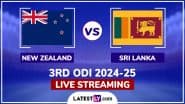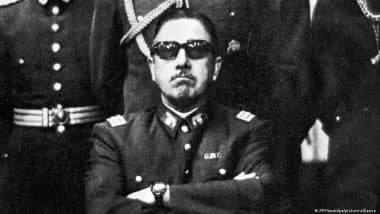Fifty years after the military coup in Chile, historians describe why Augusto Pinochet's coup had such a huge impact in Europe. A major factor was the power of images.Everyone knows the image of Che Guevara, his steely gaze directed confidently into the distance. In the counterculture of the 1960s, the "Comandante" emerged as a symbol of the idealistic revolutionary and long remained an icon of youth culture.
Also Read | India News | Six Workers Killed as Lift of Skyscraper Collapses in Maharashtra’s Thane .
The photo of Augusto Pinochet, on the other hand, embodies the dictator par excellence. The general who violently overthrew Salvador Allende's government in Chile on September 11, 1973, was commonly regarded as the ultimate evil. But why, compared to other Latin American dictators, Pinochet in particular?
Also Read | India News | UP International Trade Show 2023 to Be Conducted from Sept 21 to 25 .
Coup caught on camera
While the coup d'etat in Chile shocked the world, the 1964 coup in Brazil went relatively under the radar.
The spotlight on the Chile coup was due in large part to the widespread media presence in the country, noted Caroline Moine, professor of political and cultural history at the University of Versailles Saint-Quentin-en-Yvelines in France.
"This coup d'etat did not take place in the middle of the night and in secret, but in front of running cameras," she told DW of the events of 1973. "There were many journalists there, so the images flickered quickly across the screens, even abroad."
This was probably in the interests of the putschists, she said.
"The military wanted people to see what had happened. They wanted to impress not only their opponents, but also their supporters inside and outside the country," she said.
Through media coverage, the scenes were burned into the collective memory. The images of the bombing of the presidential palace, La Moneda, went around the world — as did the photo of the usurper Pinochet in uniform, with dark glasses and an expressionless face, sitting in front of his men.
For Joan del Alcazar, professor of contemporary history at the University of Valencia, the image of this dictator was projected in stark contrast to overthrown president, doctor Salvador Allende.
"The figure of a friendly, empathetic doctor, an undeniably attractive man, contrasts with the odious image of an unpleasant, authoritarian, despotic and, moreover, criminal military man," he told DW.
Allende a fallen symbolic figure of left-wing intellectuals
When viewed against the backdrop of the Cold War, events in Chile transcended national borders.
"In West Germany and in Europe, Allende was an important symbolic figure because he represented the democratic path to socialism; he was a very strong symbolic figure for many left-wing intellectuals," said Lasse Lassen, a historian and researcher at the University of Würzburg.
"When he was overthrown, especially in such a brutal way — with the bombing of the government palace and his suicide — he became a shining beacon for the left in Western Europe. And Pinochet embodied the image of the enemy."
At the time in Europe, the left was divided, said Caroline Moine.
"There were attempts, for example in France and Italy, to unite communist and socialist forces" in the same way as the Unidad Popular, an electoral alliance of leftist Chilean parties led by Allende.
"The coup put an end to that project and destroyed those hopes," she said. Nevertheless, the communist party in particular, but also the socialist party in Chile, very quickly launched a major international campaign after Pinochet's coup.
This not only stylized Pinochet as the embodiment of evil, but also glorified the ousted president.
"Allende was the one who wanted to defend democracy in Chile and died for it. In Europe, too, the idea of heroes who are willing to die for their ideas is highly emotionally charged," said the French historian.
Yet, she added, the various parties within the Unidad Popular were not always so united.
"It was always said that the UP was a victim of the dictatorship; there was never any public talk of internal tensions. There was a kind of myth."
Brutal repression shocked the world
The extreme brutality on the part of the coup plotters in Chile shocked more than just members of the political left.
Similar repression was being imposed by other dictatorships in the region, including in Argentina, Paraguay and Uruguay during the so-called Operation Condor camapaigns.
"[Nonetheless] this military coup stands out for its cruelty, its extreme viciousness," said Joan del Alcazar.
Historian Lassen believes knowledge of human rights abuses in Chile and simultaneous Cold War tensions in the West contributed to the coup in Chile being particularly present in people's minds.
Ultimately, however, "neither Franco nor Pinochet were condemned as Hitler was, not even in their own country," he added. "It's a complex process."
This article was originally written in Spanish.
(The above story first appeared on LatestLY on Sep 11, 2023 12:40 AM IST. For more news and updates on politics, world, sports, entertainment and lifestyle, log on to our website latestly.com).













 Quickly
Quickly




















